The Boston Common was filled with thousands of people protesting for science on Saturday afternoon. The event, which was originally planned to be a march, was changed to a protest due to the overwhelming size of attendees.
Although the website emphasized that the gathering would be nonpartisan, many of the speakers voiced concerns about President Donald Trump’s administration. Gina McCarthy, head of the U.S. Environmental Protection Agency, spoke out against Trump’s recent proposal to cut funding on research programs.
“We are now facing a presidential budget that seeks to cut the EPA staff by a third. We cannot tolerate that,” she said. “We will not let science be threatened by baseless attacks carefully designed as bills to improve science transparency on the peer review process.”
McCarthy also spoke about the necessity for environmental communities to work together and stay actively engaged. She said that if successful, the bills would act as a catalyst to unravel public health protections in the country.
“Now is not the time to consider rolling back actions that have protected us from harmful pollution,” she said. “We need to chart a course to a healthier, low-carbon future.”
Steven Holtzman, president of Decibel Therapeutics, was the next speaker in line. Having worked in the biotechnology industry for over 30 years, Holtzman explained why the industry was advocating for the support of science.
“An assault on science is an assault on the future of biotechnology,” he said. “We can only continue to harvest basic science and convert it into new medicines if it is renewed and nurtured.”
However, Holtzman also stated that there were additional, less obvious reasons for the biotechnology industry to oppose anti-science rhetoric and policies. He explained that bound up with the conception of rational scientific discourse were the ideals of the quality of participation and justice.
“Anti-science rests on the authority of the powerful, not on open-rational discourse,” he said. “We as an industry lift our voices in unwavering support for the advancement of science, yes, but also for the freedom of all with something to contribute to the discourse.”
After Holtzman’s speech was over, the event MC, Chiderah Okoye, shared her stance on the issue as a representative of the National Society of Black Engineers. Okoye spoke about her own personal experiences pursuing a career in the field.
“I found myself frequently being one of a few black faces in each of my classrooms and study groups,” she said. “We have the inclusive challenge… to make the scientific community a welcoming place for students and professionals of color to make their contributions.”
According to Okoye, currently 32,000 black engineers graduate from universities every year, making up only 3 percent of all engineering graduates. She said that their goal was to graduate 10,000 black engineers every single year by the year 2025.
Besides the adult speakers, several essay-contest winners were invited to deliver their prize-winning essays at the rally. Noah Civiello, a homeschooling fourth grader, listed the potential problems of a world without science.
“As kids, we need to be very careful of what we do to the earth. We need to keep searching for answers for all our questions in life. Never stop exploring, and never stop asking questions,” he said.
Despite the rainy weather, the rally lasted for two hours, and people stood with their protest signs throughout the speeches. A Kid’s March also took place at the Parkman Bandstand, where many families brought their children to participate in the various science activities.
Attendee Doug Dibble said that he had come to the event in support of his son, who was currently working as a scientist.
“My son is here with me today. We can’t live without science,” he said. “We have to invest in it.”

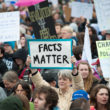
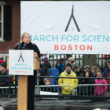
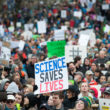
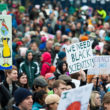
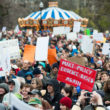
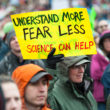
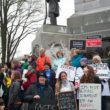
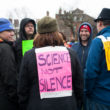
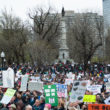
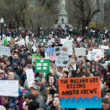
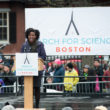
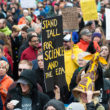
Leave a Reply
You must be logged in to post a comment.